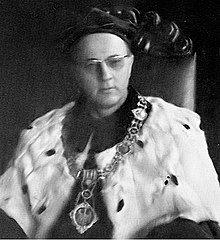Gerard Labuda
Gerard Labuda (born December 28, 1916 in Nowahutta , Karthaus district , † October 1, 2010 in Posen ) was a Polish historian and one of the country's leading medievalists .
Life
Coming from a Kashubian family, the family stayed at home when West Prussia became part of the "Polish Corridor" after the First World War and Labuda studied underground during the Second World War at the University of the Western Territories in Warsaw , where he also completed his doctorate in 1944 . After the conquest by the Red Army, he went to the Adam Mickiewicz University in Poznan . In 1950 he was appointed professor there. At the same time, he worked at the Polish Academy of Sciences from 1953 , of which he was deputy chairman from 1984 to 1986. In the academic year 1981/82 Labuda was a fellow at the Wissenschaftskolleg zu Berlin (West Berlin). From 1989 to 1994 he headed the re-activated second major Polish scientific society, Polska Akademia Umiejętności . From 1962 to 1965 he was rector of the Poznan University, from 1958 to 1961 he was also director of the Poznan Instytut Zachodni , the leading political-scientific institution for Polish research on Germany. For a long time Labuda was considered a non-dogmatic communist who enjoyed a high social reputation in the Stalin era as well as in the late People's Republic and in democratic Poland after 1989. He received high state honors for his services: the 3rd degree state award (1949, 1951) and 2nd degree (1970), the cavalier's cross with a star, etc. The Academy of Sciences of the GDR appointed him a foreign member in 1978. In 1994 he was made an honorary citizen of Gdansk , and in 1991 he was awarded the Herder Prize .
As a historian, Labuda was primarily concerned with the Polish Middle Ages and the history of the Teutonic Order . He published sources on the history of Scandinavia and the Anglo-Saxon region in the early Middle Ages . He was particularly interested in the past of the geographically broadly understood Pomerania , as a "land by the sea" between Rügen and Danzig (Prussia).
Labuda was born with Alberta Maria Teresa Wielopolska (1917–1999) married and has five children, including Adam Labuda , professor of art history at the Humboldt University in Berlin .
Publications (selection)
- Polska i krzyżacka misja w Prusach (1937)
- Studia nad początkami państwa polskiego (1946)
- Fragmenty dziejów Słowiańszczyzny zachodniej , 3 vols. (1960–1974)
- Zródła skandynawskie i anglosaskie do dziejów Słowiańszczyzny (1961)
- Historia Pomorza , Vol. 1 (1969)
- Polska granica zachodnia , 1971.
- (together with Marian Biskup ) Dzieje Zakonu Krzyżackiego w Prusach , 1986 (German: The history of the Teutonic Order in Prussia: economy, society, state, ideology. Osnabrück: fiber Verlag 2000, ISBN 3-929759-42-X )
- Pierwsze państwo polskie , 1989.
- Polsko-niemieckie rozmowy o przeszłości: zbiór rozpraw i artykułów , 1996.
- Kaszubi i dzieje. Pisma wybrane , 1996.
- Historia Kaszubów w dziejach Pomorza. Vol. 1: Czasy średniowieczne , Gdańsk 2006.
Individual evidence
- ↑ http://wyborcza.pl/nekrologi/1,101499,8452262,Zmarl_wybitny_historyk__prof__Gerard_Labuda.html
- ↑ Jörg Hackmann: Gerard Labudas conception of the history of Pomerania , in: Yearbook for the history of Central and Eastern Germany, Vol. 41, 1993, pp. 109-134.
Web links
- Literature by and about Gerard Labuda in the catalog of the German National Library
- Publications by and about Gerard Labuda at LitDok East Central Europe / Herder Institute (Marburg)
- Publications by Gerard Labuda in the Opac der Regesta Imperii
| personal data | |
|---|---|
| SURNAME | Labuda, Gerard |
| BRIEF DESCRIPTION | Polish historian and medievalist |
| DATE OF BIRTH | December 28, 1916 |
| PLACE OF BIRTH | Nowahutta , Karthaus district |
| DATE OF DEATH | October 1, 2010 |
| Place of death | Poses |
